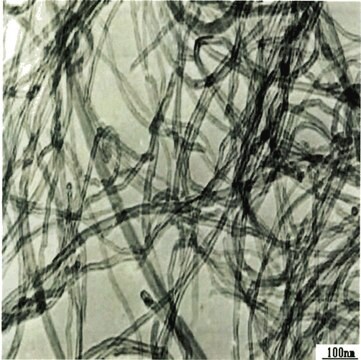406074
Carbon nanotube, multi-walled
powdered cylinder cores, 20-30% MWCNT basis, O.D. × L 7-12 nm × 0.5-10 μm, avg. no. of layers, 5 ‑ 20
Synonyme(s) :
MWCNT, MWNT, Multiwall carbon nanotube
About This Item
Produits recommandés
Niveau de qualité
Essai
20-30% MWCNT basis
Forme
powder
Caractéristiques
avg. no. of layers 5 ‑ 20
Composition
carbon content, >99% TGA
D.E. × L
7-12 nm × 0.5-10 μm
Taille moy. des particules
−270 mesh
<53 μm
Pf
3652-3697 °C (lit.)
Densité
~2.1 g/mL at 25 °C (lit.)
Chaîne SMILES
[C]
InChI
1S/C
Clé InChI
OKTJSMMVPCPJKN-UHFFFAOYSA-N
Vous recherchez des produits similaires ? Visite Guide de comparaison des produits
Catégories apparentées
Description générale
Application
Forme physique
Notes préparatoires
Autres remarques
Code de la classe de stockage
11 - Combustible Solids
Classe de danger pour l'eau (WGK)
WGK 3
Point d'éclair (°F)
Not applicable
Point d'éclair (°C)
Not applicable
Équipement de protection individuelle
dust mask type N95 (US), Eyeshields, Gloves
Faites votre choix parmi les versions les plus récentes :
Déjà en possession de ce produit ?
Retrouvez la documentation relative aux produits que vous avez récemment achetés dans la Bibliothèque de documents.
Les clients ont également consulté
Articles
Carbon nanotubes (CNTs) have received much attention since their discovery in 1991 by Sumio lijima1 due to their excellent mechanical, electrical, and optical properties.
A nanocomposite is typically defined as a mixture between a host material (e.g., polymer matrix) and nanofillers with at least one dimension of less than 100 nm.
Graphene is a one-atomic-layer thick two-dimensional material made of carbon atoms arranged in a honeycomb structure. Its fascinating electrical, optical, and mechanical properties ignited enormous interdisciplinary interest from the physics, chemistry, and materials science fields.
Building and Engineering Micro/Nano Architectures of Single-Walled Carbon Nanotubes for Electronic Applications
Global Trade Item Number
| Référence | GTIN |
|---|---|
| 406074-25G | |
| 406074-500MG | 4061831987584 |
| 406074-5G | 4061833355398 |
| 406074-100MG | |
| 406074-1G | 4061831987577 |
| 406074-25MG |
Notre équipe de scientifiques dispose d'une expérience dans tous les secteurs de la recherche, notamment en sciences de la vie, science des matériaux, synthèse chimique, chromatographie, analyse et dans de nombreux autres domaines..
Contacter notre Service technique




